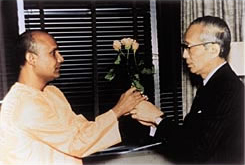Recipients
It had been bestowed by The Peace Meditation at the United Nations upon Mahathir Mohamad, Nelson Mandela, Mikhail Gorbachev, Pope John Paul II, Mother Teresa, Javier Pérez de Cuéllar, Kurt Waldheim the Dalai Lama, Desmond Tutu, Dada Vaswani, Swami Satchidananda and U Thant's daughter, Daw Aye Aye Thant. [3]
The U Thant Distinguished Lecture Series is a forum through which eminent thinkers and world leaders speak on the role of the United Nations in addressing the challenges facing the world's peoples and nations in the 21st century. The lecture series is co-organized by the United Nations University and the Science Council of Japan.
The UNU has a tradition of inviting world leaders and renowned individuals to Tokyo to explore the role of the United Nations in a rapidly changing world. The U Thant Distinguished Lecture Series builds upon this tradition by providing an opportunity for Nobel laureates and heads of state, current and former, to share their insights and experiences with scholars, policymakers, business leaders and the public.
On April 8, 2006, the Award was offered to Kofi Annan, who refused it. Similarly in 2007, Ban Ki-moon declined the Award.
This page is based on this
Wikipedia article Text is available under the
CC BY-SA 4.0 license; additional terms may apply.
Images, videos and audio are available under their respective licenses.
